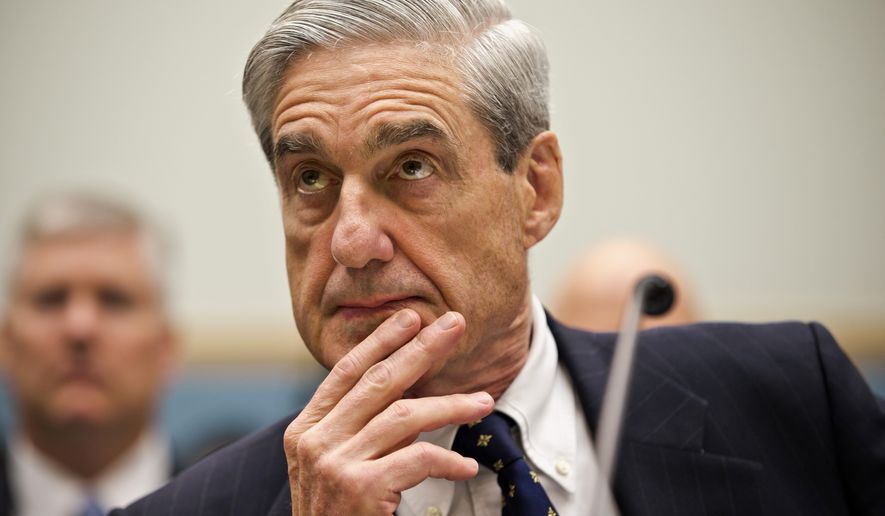Robert Mueller defended his appointment and authority as special counsel in a legal brief referencing precedents involving Watergate and other past presidential scandals.
The special counsel’s office cited the scandal that culminated in former President Richard Nixon’s resignation in response to a legal challenge mounted on behalf of Andrew Miller, an associate of President Trump’s former campaign adviser Roger Stone.
Filed in D.C. federal appeals court Friday, the 71-page brief claimed that previous appointments make it clear that Mr. Mueller is legally authorized to investigate allegations of Russian interference in the 2016 election and related matters, contrary to arguments raised by Mr. Miller.
“These instances — involving appointments by Attorneys General under Presidents Garfield, Theodore Roosevelt, Truman, Kennedy, Nixon, Carter, George H.W. Bush and Clinton — span nearly 140 years and include some of the most notorious scandals in the Nation’s history, including Watergate,” wrote Michael Dreeben, U.S. deputy solicitor general.
The Supreme Court ruled during Watergate that “the Attorney General has statutory authority to appoint a special counsel and delegate prosecutorial authority to him,” Mr. Dreeben wrote. “That precedent forecloses Miller’s challenge to the statutory authority for the appointment here.”
Mr. Miller is among several people contacted by the special counsel’s office with ties to Mr. Stone, an early adviser to Mr. Trump’s presidential election campaign, and was served with a grand jury subpoena in May compelling him to produce documents and testimony.
His attorneys moved to quash the subpoena in June, however, but a D.C. federal court judge ruled for the special counsel’s office and ultimately decided to hold Mr. Miller in contempt, pending the outcome of the appeal at hand.
Paul Kamenar, an attorney for Mr. Miller filing the appeal with the aid of the National Legal & Policy Center, claimed in a previous filing that the special counsel lacks authority because he was appointed by the deputy attorney general, Rod Rosenstein, rather than the attorney general, Jeff Sessions, in light of the latter recusing himself from matters related to the 2016 race.
“While General Sessions may have recused himself from a certain investigation, he cannot divest himself of or delegate his constitutional duty to appoint the investigator,” Mr. Kamenar argued on appeal.
Responding on behalf of the special counsel’s office, Mr. Dreeben compared the appellant’s arguments to one raised by the late president.
“In Nixon, the Attorney General appointed a special prosecutor to investigate and prosecute offenses arising from the 1972 presidential election, empowering the prosecutor through an expansive regulation,” he recalled in the filing.
Nixon claimed the case was not justiciable because the president’s decision in prosecutions was “final,” but the Supreme Court ruled otherwise and found that the special prosecutors in that case had acted pursuant to a proper delegation of the attorney general’s authority, wrote Mr. Dreeben.
“Here, the Acting Attorney General exercised that statutory authority to appoint the Special Counsel, whose mandate is, for these purposes, indistinguishable from those approved in Nixon,” he added.
Mr. Kamenar is expected to file his reply by Oct. 9, and oral arguments in the matter have been scheduled for Nov. 9 before a three-judge panel of the D.C. Circuit Court of Appeals.
Speaking to The Washington Times on Saturday, Mr. Kamenar claimed the government failed to address several arguments raised in his own filing surrounding Mr. Mueller’s status, including concerns related to the statutory authority involved in appointing special counsels.
“It was basically an assumption that the court ruled that there was authority to appoint the Watergate special prosecutor there, and so we’re arguing that it really wasn’t definitively litigated,” Mr. Kamenar told The Times. “We think that if this goes to the Supreme Court, which it will … and if the court hears it, we think we have the better of the arguments.”
• Andrew Blake can be reached at ablake@washingtontimes.com.




Please read our comment policy before commenting.